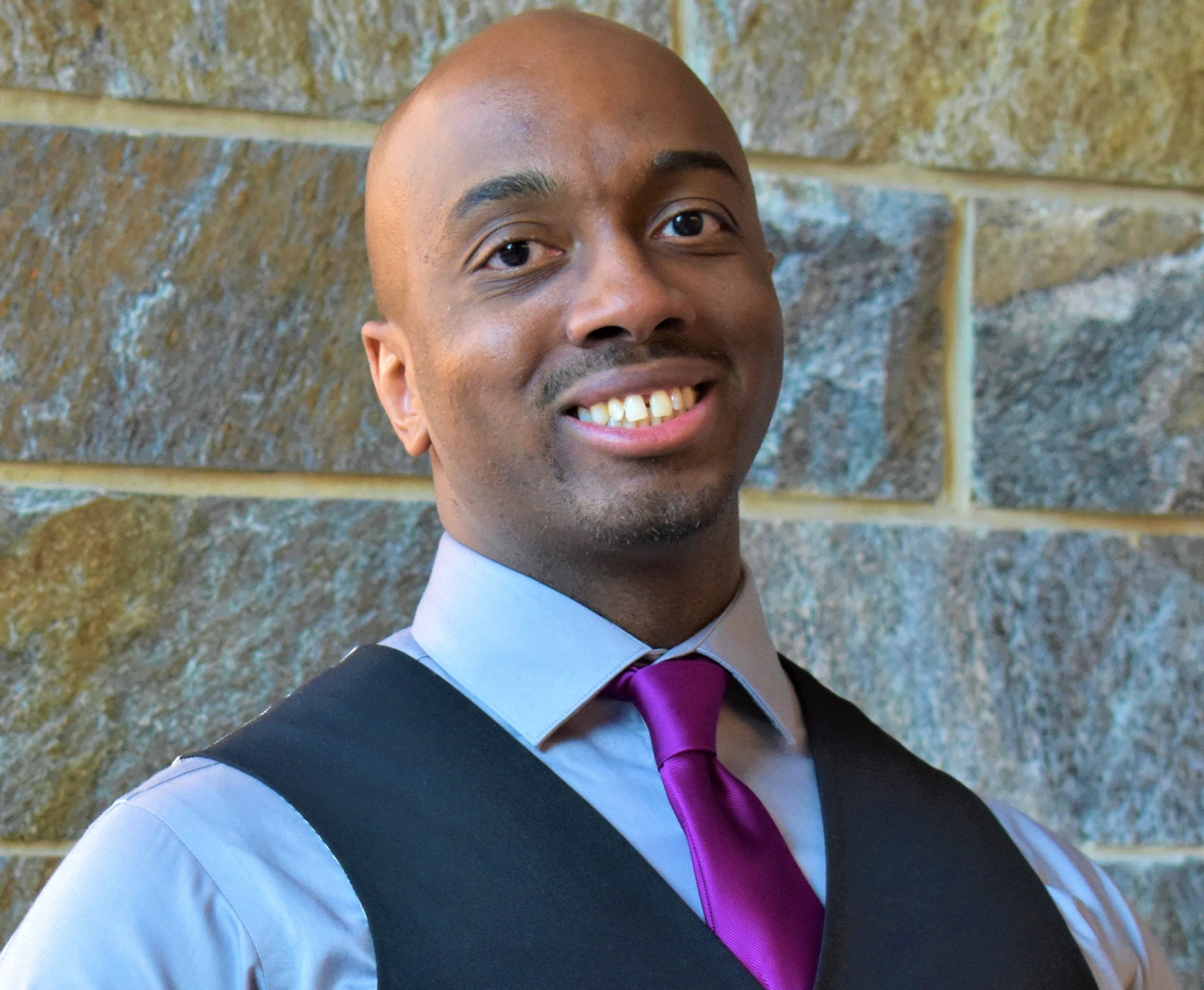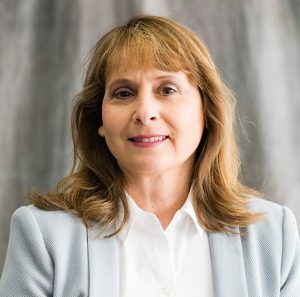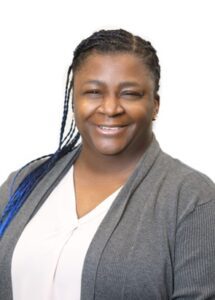
5 Questions with Caleb McKinney, Ph.D., MPS., Assistant Dean, Georgetown University Biomedical Graduate Education
“5 Questions With…” is a weekly BioBuzz series where we reach out to interesting people in the BioHealth Capital Region to share a little about themselves, their work, and maybe something completely unrelated. This week we welcome 5 Questions with Caleb McKinney, Ph.D., MPS., Assistant Dean of Graduate and Postdoctoral Training & Development for Biomedical Graduate Education and Assistant Professor in the Department of Rehabilitation Medicine at the Georgetown University Medical Center.
Caleb McKinney, Ph.D., MPS, is committed to advocacy and career formation of graduate students, postdoctoral and clinical fellows. His research focus is on career transitions in the biomedical workforce, with an emphasis on designing and evaluating interventions that facilitate these transitions. Dr. McKinney is the Assistant Dean of Graduate and Postdoctoral Training & Development for Biomedical Graduate Education and Assistant Professor in the Department of Rehabilitation Medicine at the Georgetown University Medical Center.
He is also a member of the Board of Directors and serves as Treasurer of the National Postdoctoral Association. His administrative portfolio includes a range of offices with functionalities that span the student training experience, including career strategy, proposal development for institutional training programs, student and postdoctoral engagement, and recruitment and marketing.
Dr. McKinney graduated from Cornell University with a B.S. in Biology and a minor in Applied Economics and Management. He then completed his Ph.D. in microbiology from New York University. He is a huge proponent of lifelong learning, and in recent years has completed professional certificates in project management and budget and finance. In 2020, he completed a Master’s in Professional Studies program in Design Management and Communications at Georgetown University.
1. Please introduce yourself to our audience with a look back at your education, training, and career.
My career was rooted in biomedical research. I was trained as a molecular virologist, and I studied virology through undergraduate, graduate school, and postdoc fellowship. My scientific research career focused on understanding how viruses manipulate host cell pathways and machinery to propagate themselves. I was also fascinated by how much we could learn about the actual functionality of our cells through viral perturbations. Being a black scientist in a space where there aren’t many of us wasn’t easy, but I had amazing mentors along my career journey who inspired me and provided resources and opportunities for me to succeed.
During my postdoc training, I embraced my passion for outreach, mentorship, and professional development and sought opportunities to help students and trainees reach their career goals. At that point, I realized that I could scale my impact through a career in higher education administration, so I joined Georgetown University to build out a training and development portfolio to support graduate students and postdocs.
After getting settled into my role, I sought educational opportunities to broaden my skill set and support innovations in educational training. I completed a Masters of Professional Studies degree in Design Management and Communications, which was incredibly helpful in getting me to use design thinking frameworks to develop human-centered strategies and programs for student success.
One of my design leadership course projects was funded by a foundation grant (shout out to Burroughs Welcome Fund!) to build out a project management training module for biomedical graduate students to learn and use industry skills during their academic research training. I integrate disciplines in unique and innovative ways, which has become a hallmark in how I navigate my career and train students and postdocs to think about their own career development.
2. When we talk about Biotech/Biohealth/Biomed in this region, you typically hear about Maryland, Johns Hopkins, George Mason. Tell us about the program at Georgetown.
Georgetown University Biomedical Graduate Education is home to 36 graduate programs that include graduate certificates or master’s and Ph.D. level advanced degrees. Georgetown University Medical Center is a research-intensive academic medical center with strong clinical strengths through our academic partnership with MedStar Health. Additionally, collaborations throughout our Georgetown University campuses and schools foster an enriched educational environment for interdisciplinary learning and career formation. This is evidenced in the career success of our Biomedical Graduate Education alumni. We recently published an institutional analysis of our M.S. program graduate career outcomes in the peer-reviewed literature that analyzes the workforce footprint of our graduates across 15 of our M.S. programs.
Georgetown University’s Jesuit value of Cura Personalis, or “care for the whole person” transcends our teaching philosophy, ensuring that our graduate programs provide a well-rounded and transformative educational experience which includes experiential opportunities. Pertinent to the biohealth audience, our Biotechnology Master’s program is approaching its 25th anniversary in 2022 and has graduated over 1000 students with a robust workforce footprint in the BioHealth Capital Region. Hallmarks of our Biotechnology program are hands-on learning through laboratory and project-based coursework, professional skills and business training, and experiential internship placements in research and industry contexts throughout the BioHealth region.
Some of our other graduate programs with strong industry ties and experiential learning opportunities include: Health Informatics & Data Science, System’s Medicine, Clinical & Translational Research, Bioinformatics, Biostatistics, Biochemistry Molecular & Cell Biology, Biohazardous Threat Agents & Emerging Infectious Diseases, Biomedical Science Policy & Advocacy (all M.S. programs), and our Executive Masters in Clinical Quality Safety and Leadership (an EMCQSL program). I invite anyone interested to connect with me on LinkedIn to learn more!
3. Before going to Georgetown you were at the National Institute of Allergy and Infectious Diseases (NIAID). How did your time at NIH prepare you for your current role?
Having a background similar to the trainees I’d be serving was very helpful in making the initial transition to higher ed administration. The paradigm of generating testable hypotheses also translates very well to the type of work I do in administration. It forces me to think about aligning my programs’ goals and learning outcomes with the needs of my students and postdocs. Akin to laboratory research, I ask myself: how do I know this [program] will work? What data do I need to collect to be sure.
Also, designing and following processes was a key transferable skill that I brought to administration. As a scientist, I am wired to think about system-level processes and troubleshoot processes from beginning to end. For example, if I don’t effectively coordinate different protocols of a western blot, and fix problems along the way, then I’m not going to have any bands. That thinking was constructive in an administrative context as well, particularly when designing institutional policies and standard operating procedures.
Lastly, the NIH, similar to academic research institutions, has administrative structures that span workforce sectors. This created many opportunities for me to learn about different types of careers that I could pursue with my graduate-level scientific training. I volunteered in our Office of Training and Diversity, which allowed me the opportunity to manage career development programs and put on a conference.
While short-term and part-time, this experience conferred the linear work experience necessary to transition into my administrative role at Georgetown. I advise students and postdocs to explore their career interests and find ways to diversify their experiences to gain cross-functional skills. There are many career options available for people trained in science, so being able to showcase the professional value and integrate skills from different contexts is incredibly helpful.
4. When you look forward to the next 5-10 years, what do you believe students entering the biohealth world need most to succeed?
To continue developing, supporting, and sustaining emerging technologies, the biohealth world will need a talent pipeline of interdisciplinary, industry-ready graduates who can adapt to working on cross-functional teams in an evolving landscape. With advances in technology and automation, there is an increasing need for students to showcase interpersonal aptitudes such as leadership, teamwork, and communication skills in order to stand out. The industry requires you to work on teams, and people on teams achieve more than they do on their own, particularly when you leverage diversity of experiences and backgrounds.
Many of our graduate programs incorporate project-based learning in teams. I encourage our students to cultivate and describe experiences where they’ve helped the team achieve more through their contribution. Also, how they’ve supported their teammates and helped their teammates, mainly through conflicts and challenges.
The contemporary needs of the biohealth workforce is a huge driver for the curriculum design of our graduate programs. Experiential opportunities through internships and capstones with employer partners provide a key avenue for students to operationalize their skills, gain linear work experience, and contribute to company goals. Pipeline development can come full circle through industry partnerships with academic institutions to facilitate these important experiences for students.
For example, our long-standing Biotechnology graduate program has alumni professionals in the industry who teach in the program and provide internship placements for our students. We also have formal internship collaboration partnerships with companies. We are certainly open to broadening the portfolio of experiential opportunities for our students, and we look forward to continuing to engage and partner with groups throughout the biohealth network.
5. Suppose you hit the lotto tomorrow with enough money to support you forever. What would you do?
Well, I get bored a little too quickly to give up work entirely for a life of luxury, so perhaps a nice house with a garden and a home gym would be a good start. I think health and wellness are so important, and it is key to bringing your whole self to your passions and to your work. I’d like to fund pipeline educational initiatives that broaden access to science careers with the remaining money. I have lots of ideas and have written plenty of grants, competing for limited resources.
I would start with an endowed program that provides full-ride scholarships to a cohort of underrepresented students to complete graduate degrees and receive mentorship and professional development opportunities to prepare them for careers in science. I couldn’t enjoy my new house and garden unless I knew that I made a difference, and investing in initiatives to diversify the biohealth workforce would give me that sense of purpose. If anyone wins the lottery before me and likes these ideas, let’s talk.
Thank you Caleb McKinney, Ph.D., MPS., Assistant Dean of Graduate and Postdoctoral Training & Development for Biomedical Graduate Education and Assistant Professor in the Department of Rehabilitation Medicine at the Georgetown University Medical Center for participating in the ‘5 Questions with BioBuzz’ series, and stay tuned for more interviews with others from across the BioHealth Capital Region and beyond.






